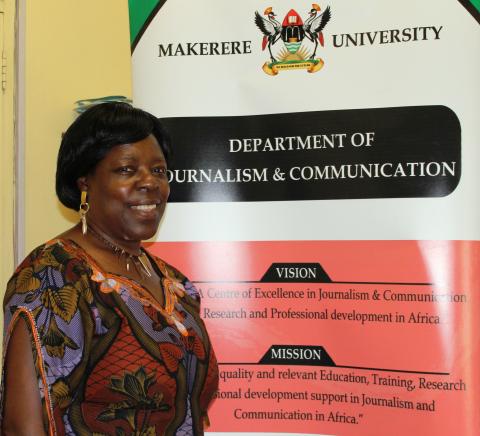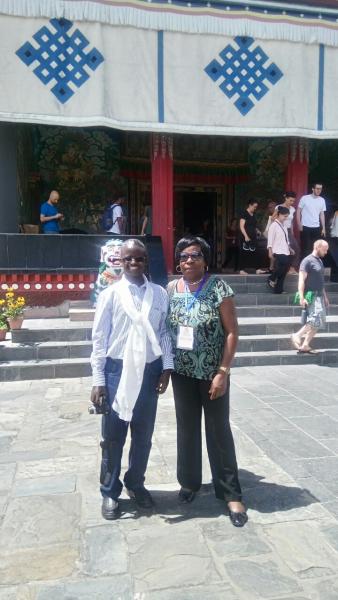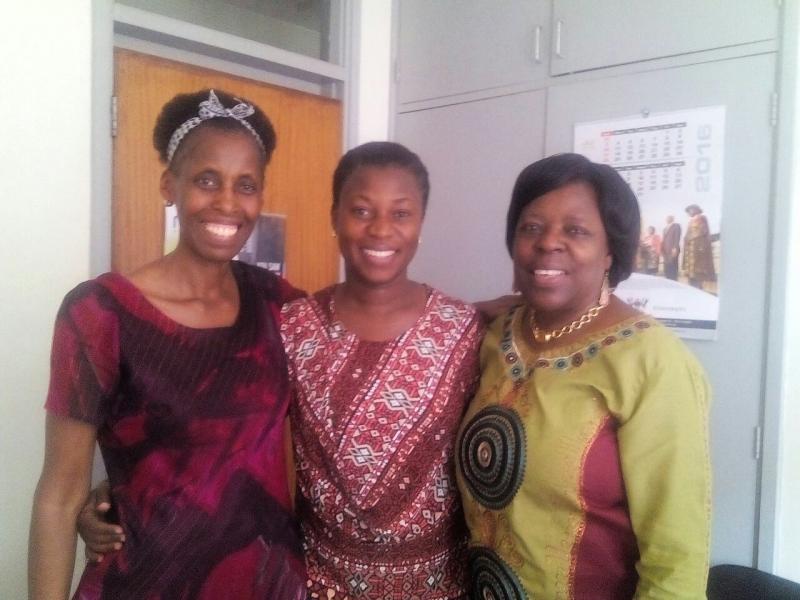
On 29th July 2016, the Department of Journalism and Communication at Makerere University was awash with news of the promotion of Assoc. Professor Goretti Nassanga to full Professor. This highly dedicated member of staff started off as a Lecturer and has since grown through the ranks to take up the most top coveted position in academia. Her appointment makes her the first full professor in Journalism and Communication at Makerere University and probably the only Ugandan of her kind working in the country at the moment. She was the first Ph.D graduate from the Department at Makerere University, as well as the first Head of Department.
Professor Nassanga has had a long experience of 37 years in media practice, starting off as a journalist in 1979, moved into training in 1989 and is currently a professor and researcher. Apart from lecturing and supervision of students, she has carried out research in several areas relating to the media, and participated in the drafting of the National Population Policy as well as the National ICT Policy. She has published 30 articles in local and international journals, and has been a consultant to national, regional and international projects. She is a former Chairperson of the Media Council.
How has Professor Nassanga come to realize this dream?
Full of smiles, Prof. Nassanga narrates her long journey to the top of the academic ladder to Marion Alina.
“This qualification means a lot to me. I look back at all the years of hard work, right from primary one. Through all those stages, I have been able to reach the peak and I am satisfied. I have reached what Abraham Maslow calls self-actualization, a point in life when you are able to realize your full potential. It is something not many people manage to achieve, so I am grateful to God for this,” the God-fearing lady asserts.
The current Chair of the Department of Journalism and Communication, Dr. William Tayeebwa was filled with joy on the news of t his promotion. “As a scholar, Prof. Nassanga has led by example and published widely in addition to supervising several graduate students to completion. She continues to provide leadership to all staff in her capacity as Coordinator for Research and publications. We are eternally grateful to her because she has stayed around to nurture the Department she started two decades ago. Many senior colleagues have since left. We count on her to see the Department grow into a School, with her as our first Dean,” he says.
his promotion. “As a scholar, Prof. Nassanga has led by example and published widely in addition to supervising several graduate students to completion. She continues to provide leadership to all staff in her capacity as Coordinator for Research and publications. We are eternally grateful to her because she has stayed around to nurture the Department she started two decades ago. Many senior colleagues have since left. We count on her to see the Department grow into a School, with her as our first Dean,” he says.
“Her promotion is wonderful news for us. We have waited for a long time to have a full professor at the Department. It is a good sign that the Department is growing. We hope to ride on her position to grow further,” says a jovial Dr. Aisha Nakiwala, another member of staff. At a recent Department retreat, the Chair thanked Prof. Nassanga for supervising several post graduate students not only from the Department of Journalism and Communication, but from other Departments within the University. He was particularly grateful that Prof. Nassanga’s motherly heart knows no boundaries. Her soft nature and free spirit continues to humble many.
Views on Journalism and media in the country and beyond
Prof. Nassanga believes that with the increase in the number of journalism and media training institutions in the country, the standard of journalism practice has improved. “Apart from Makerere University, we now have other universities offering degrees in journalism. This is a positive development for Uganda’s media,” she says. However, Prof. Nassanga is concerned about the current trends in the media both at a national and regional level. She is perturbed at the trends of media ownership concentration, where two strong conglomerates have been allowed to emerge, with minimum regulation, and is also concerned about the misuse of social media.
“We have citizen journalism now, so information collection and dissemination is no longer a monopoly of journalists. This comes with a cost since regulation is now a big issue both nationally and internationally. People feel they have unlimited freedom to inform others especially on social media, but often forget that others also need to enjoy their freedom, so the individual freedoms have to be exercised responsibly, so as not to jeopardize other people’s freedoms. Some of the media content, particularly on social media infringes on other people’s privacy,” she explains.
“At the regional level, we are getting this trend of media concentration. Business wise, it makes very good sense because now things are becoming cheaper and production costs are lower; although the cover price still continues to rise. This concentration of a few media conglomerates like the Nation Media Group and the Vision Group denies audiences diversity of content and fewer and fewer voices get heard. The few media conglomerates have too much power and this can be difficult to control even for governments in future. It would be best to create an environment that allows more owners into the playing field as opposed to having just a few people owning media companies across the divide. In some countries you cannot own radio, television and print media houses in the same geographical area. You can only have a certain percentage to avoid such media concentration and allow for fair play. This is still a problem that developing countries have not yet foreseen, in relation to regulating the airwaves,” she opines.
The genesis
A young and tidy Goretti Nassanga attended Naggalama and Namilyango primary schools. She enrolled at St. Mary’s Namagunga for her Ordinary and Advanced level education before joining Makerere University. “At Advanced level, my subject combination was Literature, Economics, Geography, sub- maths and General Paper. I particularly liked the economics because most of the decisions we make either in our professional work or as individuals are largely based on economic considerations.” She graduated with a Bachelor of Arts in Social Work and Social Administration in 1979 and then joined the work force as an Information Officer/News Reporter under the Ministry of Information. This shaped her career in the field of journalism. “It was by accident. I never really thought about being a journalist at first. During our time, the arrangement was that officials from Public Service interviewed graduates and the best performing ones got employed,” she reminisces. “I got several openings but did not want to keep moving from one upcountry job to another. So I opted for an opening at the Ministry of Information. I was required to file stories to the Uganda News Agency to air on Radio Uganda and Uganda Television”.
As a reporter on the general desk, Prof. Nassanga was exposed to covering news items on almost all subjects. This awakened her insatiable appetite for news and current affairs. She bonded for life. “Before joining journalism, my idea of Uganda was the 15-km radius from home to my former schools; Naggalama, which is 10km from Mukono - my home, Namagunga which is 8kms from Mukono, and Makerere, about 18kms. As a journalist, I have been able to move all over Uganda. I have been to many other countries all because of the nature of my job either as a Journalist or as an academic. I thank God for giving me the grace to choose something I have greatly benefitted from. The pay is not much in journalism but you get wide exposure and get to learn a lot of things which you would not have learnt staying on one desk job. Here, we are not looking at only financial rewards but the social capital in terms of wide knowledge gained with local and international networks,” she asserts.
From the Information Ministry, the young and energetic Nassanga moved to the Parliament of Uganda as Head of the Parliament Desk. This role meant that she was in charge of covering Parliament sessions and the Office of the Speaker. It was not long before Nassanga quickly moved through the ranks to become Head of the Presidential Press Unit for about two years.
Joining Academia
With all the amassed experience, in 1989, Prof. Nassanga was invited to join teaching at the School of Journalism at Uganda Management Institute as a lecturer, after whi ch she was appointed the Principal of this school for two years. In 1993, she joined Makerere University to teach on the Journalism programme, by then under the Literature Department and was the first full-time Coordinator. “I worked with Dr. Monica Chibita and later got other staff to join us. In 1998, we were granted autonomy to become a full Department and I was appointed the first Head of Department. It was not an easy break to gain our independence. The Department of Literature wanted us to stay since we had bonded, but we needed to secede and grow, just like any youth has to leave the parents to start an independent life,” she explains.
ch she was appointed the Principal of this school for two years. In 1993, she joined Makerere University to teach on the Journalism programme, by then under the Literature Department and was the first full-time Coordinator. “I worked with Dr. Monica Chibita and later got other staff to join us. In 1998, we were granted autonomy to become a full Department and I was appointed the first Head of Department. It was not an easy break to gain our independence. The Department of Literature wanted us to stay since we had bonded, but we needed to secede and grow, just like any youth has to leave the parents to start an independent life,” she explains.
In 1992, Nassanga graduated with a Masters degree in Journalism from University College of Wales, Cardiff. She later enrolled for a Doctorate (PhD) at Makerere University and graduated in 2003. This was the first PhD at the Department. “It was a big occasion for the whole journalism fraternity to get the first doctorate in Journalism & Communication from Makerere University. We have continued to grow since then, with a number of staff at the Department attaining Ph.Ds, but mostly from abroad.”
In 2005, Dr. Nassanga handed over the Department headship to Dr. Peter Mwesige. She continued to lecture and do research until 2010 when she was promoted to Associate Professor. “In between the lecturing, conducting research and supervising both under graduate and postgraduate students, I managed to accumulate the required number of publications after four years as Associate Professor to apply to be promoted to the top rank of Professor. This should have come earlier in 2014 when I applied but the process is so rigorous with external reviewers so it took two years before the final promotion came through. In July 2016, I was promoted to full professor,” she says, as her lips break into the biggest smile I have seen since we started this conversation.
Message to women in relation to post-graduate studies
A September 2016 analysis by the Directorate of Quality assurance at Makerere University puts the number of female professors at 8, in comparison to 68 male professors. “This analysis is based on data from the University’s Directorate of Human Resources. “We have continued to see an improvement in the number of female professors, although more efforts in needed,” explains Dr. Vincent Ssembatya, the Director Quality Assurance, who is equally excited about Prof. Goretti Nassanga’s appointment.
A section of society still believes that a highly educated woman is unruly in a home, and this partly explains the hesitation by some women to pursue higher studies. Prof. Nassanga acknowledges this stereotype and advises that “Women who pursue further studies have to be conscience of this stereotype and put extra effort in reconciling time for their office work, studies and the home responsibilities. This is because if anything goes wrong, and of course in many marriages things will go wrong at some point, the educated woman takes the blame. The woman should seek, whenever possible, to try to rectify whatever goes wrong early before matters get out of hand, because the woman will be the first to be blamed, fairly or unfairly.”
Prof. Nassanga adds that it takes two to tangle and the husbands to such women need to embrace the advantages that come with higher education. “The husbands to highly educated women should try to empathize and put themselves in the wife’s shoes. If they got this opportunity to pursue further studies, perhaps they too would have taken it. If your partner is lucky to get this chance, try not to frustrate her. Support her because it is for the benefit of the entire family. If she realizes her full potential, you will be reaching consensus on several issues as opposed to pulling in opposite directions. This is also good for the children because they have a role model to pick from. It is a blessing to the family and should be harnessed,” she guides.
Keeping abreast with the news
As part of her routine, Prof. Nassanga listens to radio news regularly and will not miss out on television prime time news. You will find a copy of one of the dailies in her possession, or she will read the online papers. The tech-savvy professor diligently responds to all emails on time and is an active participant on the Department’s WhatsApp group.
Prof. Nassanga was married to Charles Mugoya (RIP), who passed on in 1996, leaving behind one son, Kenneth Mugoya.
That is a glimpse of the ‘PROF,’ as she is popularly called at the Department by both staff and students.
Article by Marion Alina
Photos by Tonny Luggya
- Log in to post comments




